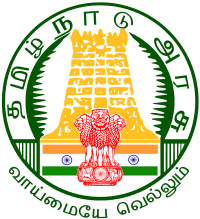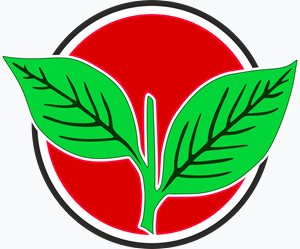
The All India Anna Dravida Munnetra Kazhagam is an Indian regional political party with great influence in the state of Tamil Nadu and the union territory of Puducherry. It is a Dravidian party founded by the former chief minister of Tamil Nadu M. G. Ramachandran (M.G.R.) at Madurai on 17 October 1972 as a breakaway faction from the Dravida Munnetra Kazhagam after M. Karunanidhi expelled him from the party for demanding an account as the party treasurer. The party is adhering to the policy of socialism and secularism based on the principles of C. N. Annadurai (Anna) collectively coined as Annaism by M.G.R. The party has won a seven-time majority in the Tamil Nadu Legislative Assembly and has emerged as the most successful political outfit in the state's history. It is currently the main opposition party in the Tamil Nadu Legislative Assembly.
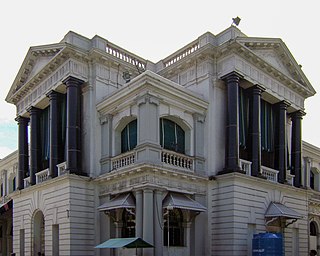
Fort St. George is a fortress at the coastal city of Chennai, India. Founded in 1639, it was the first English fortress in India. The construction of the fort provided the impetus for further settlements and trading activity, in what was originally an uninhabited land. Thus, it is a feasible contention to say that the city evolved around the fortress. The fort currently houses the Tamil Nadu legislative assembly and other official buildings.
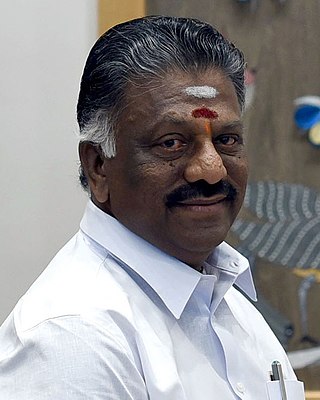
Ottakarathevar Panneerselvam, popularly known as OPS is an Indian politician who was the 6th Chief Minister of Tamil Nadu briefly in December 2016 and previously from 2001 to 2002 and again from 2014 to 2015. As finance minister, he has presented the Tamil Nadu state budget 11 times.

M. Fathima Beevi was an Indian judge who was a justice of the Supreme Court of India. Appointed to the apex Court in 1989, she became the first female judge to be a part of the Supreme Court of India, and the first Muslim woman to be appointed to any of the higher judiciaries in the country. On her retirement from the court, she served as a member of the National Human Rights Commission and later as the Governor of the Indian state of Tamil Nadu from 1997 to 2001. In 2023, she was honoured with Kerala Prabha Award, the second-highest honour given by the Government of Kerala. In the 2024 honours list, she was posthumously awarded the Padma Bhushan.

Tamil Nadu Legislative Council was the upper house of the former bicameral legislature of the Indian state of Tamil Nadu. It began its existence as Madras Legislative Council, the first provincial legislature for Madras Presidency. It was initially created as an advisory body in 1861, by the British colonial government. It was established by the Indian Councils Act 1861, enacted in the British parliament in the aftermath of the Indian Rebellion of 1857. Its role and strength were later expanded by the second Council Act of 1892. Limited election was introduced in 1909. The Council became a unicameral legislative body in 1921 and eventually the upper chamber of a bicameral legislature in 1937. After India became independent in 1947, it continued to be the upper chamber of the legislature of Madras State, one of the successor states to the Madras Presidency. It was renamed as the Tamil Nadu Legislative Council when the state was renamed as Tamil Nadu in 1969. The Council was abolished by the M. G. Ramachandran administration on 1 November 1986. In 1989, 1996 and 2010, the DMK regime headed by M. Karunanidhi tried to revive the Council. The former AIADMK regime (2016-2021) expressed its intention not to revive the council and passed a resolution in the Tamil Nadu Legislative Assembly in this regard.

The Government of Kerala, also known as the Kerala Government, is the administrative body responsible for governing Indian state of Kerala. The government is led by a chief minister, who selects all the other ministers. The chief minister and their most senior ministers belong to the supreme decision-making committee, known as the cabinet.

The first legislative assembly Election to the Madras state based on universal adult suffrage was held in 27 March 1952. This was the first election held in Madras state after the Indian Independence. This election was officially known as the 1951 Madras State Election, even though through delays, actual voting didn't take place until early 1952.
Tamil Nadu has a parliamentary system as defined by its constitution, with power distributed between the state government and the districts.

The Tamil Nadu Legislative Assembly is the unicameral legislature of the Indian state of Tamil Nadu. It has a strength of 234 members, all of whom are democratically elected using the first-past-the-post system. The presiding officer of the Assembly is the Speaker. The term of the Assembly is five years, unless dissolved earlier.

Edappadi Karuppa Palaniswami, often referred to by his initials E.P.S., is an Indian politician who is the current leader of opposition in the Tamil Nadu Legislative Assembly. He served as the seventh chief minister of Tamil Nadu, from 2017 to 2021. He has been the General Secretary of All India Anna Dravida Munnetra Kazhagam (AIADMK) since 28 March 2023. Previously, Palaniswami has served as the interim general secretary (2022–23), joint co-ordinator (2017–22) and headquarters secretary (2016–22) of AIADMK.
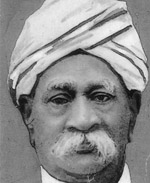
The first legislative council election to Madras Presidency after the establishment of dyarchical system of government by the Government of India Act 1919, was held in November 1920. Indian National Congress boycotted the election due to its participation in the Non-cooperation movement. The election occurred during the early stages of non-Brahmin movement and the major issue of the election was anti-Brahminism. Justice party won the election with no significant opposition and A. Subbarayalu Reddiar became the inaugural First Minister of the presidency.

Justice S. Ashok Kumar was a judge of the Madras High Court and the Andhra Pradesh High Court in India.
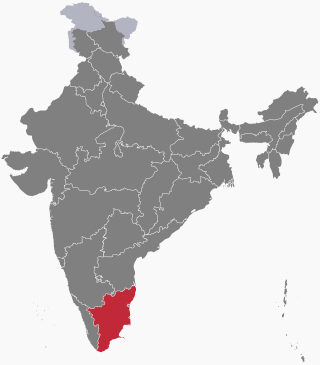
The following outline is provided as an overview of and topical guide to Tamil Nadu:
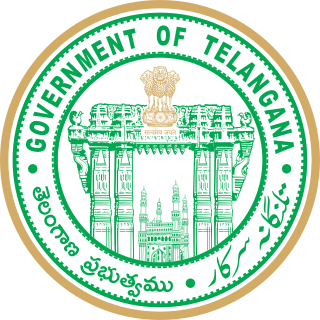
The Government of Telangana also known as TelanganaGovernment, is the governing authority of the state of Telangana in India. It consists of an executive, a judiciary and a legislative.

Dr. Tamilisai Soundararajan is an Indian politician belongs to Bharatiya Janata Party. She served as the second Governor of Telangana, and also served as Lieutenant Governor of Puducherry from 18 February 2021 to 18 March 2024. She was the National Secretary and Tamil Nadu State Unit President of the BJP prior to this appointment.

Government of Puducherry is the union territorial government for the union territory of Puducherry, India. It is headed by the Lieutenant Governor of Puducherry. Its capital is located at Pondicherry.
TANSI land acquisition case was a sensational case against J. Jayalalithaa in Tamil Nadu, during 1991-96. Jaya Publication and Sasi Enterprises, the companies in which J. Jayalalithaa and her aide V. K. Sasikala had holdings, purchased lands of Tamil Nadu Small Industries Corporation (TANSI), a state government agency, in 1992. The case was filed by Subramanian Swamy and chargesheet were filed during the following DMK government headed by M. Karunanidhi in 1996. Jayalalitha and her aide, Sasikala were convicted in the lower court, which sentenced her to two year rigorous imprisonment and fined ₹50,000 on 9 October 2000. The case had political implications as Jayalalithaa was disqualified from contesting the 2001 Tamil Nadu Legislative Assembly election. Though Jayalalithaa's nomination papers were rejected, she took oath as chief minister after the victory of AIADMK in the elections. The Supreme Court disqualified her in September 2001, resulting in her stepping down and elevation of O. Panneerselvam as the chief minister. The governor of Tamil Nadu, Fathima Beevi, who administered oath to J. Jayalalithaa, was advised to step down by the union ministry, who also sent the report to the President of India.
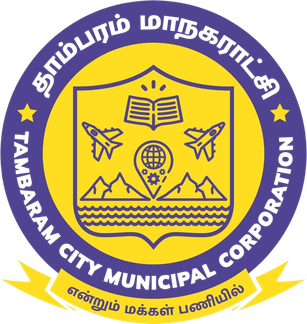
Tambaram City Municipal Corporation (TCMC) is a local government of the City of Tambaram within the Chennai Metropolitan Area of Tamil Nadu, India. It covers an area of 87.64 sq. km in the Chengalpattu district, and has an estimated 2021 population of 960,887.

The Madras High Court is a High Court in India. It has appellate jurisdiction over the state of Tamil Nadu and the union territory of Puducherry. It is located in Chennai, and is one of the oldest high courts of India along with Calcutta High Court in Kolkata and Bombay High Court in Mumbai. The Madras High Court is one of four charter high courts of colonial India established in the four Presidency Towns of Madras, Bombay, Allahabad and Calcutta by letters patent granted by Queen Victoria, dated 26 June 1862. It exercises original jurisdiction over the city of Chennai, as well as extraordinary original jurisdiction, civil and criminal, under the letters patent and special original jurisdiction for the issue of writs under the Constitution of India. Covering 107 acres, the court complex is one of the largest in the world, second only to the Supreme Court of the United Kingdom. The four-storey administrative building attracts hundreds of litigants every day.
